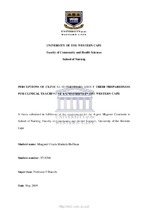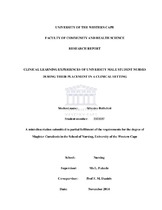| dc.description.abstract | Background: Clinical supervision or clinical accompaniment is considered an integral part of nursing education and is crucial for the development of nursing students’ clinical competence. In order to achieve this, clinical supervision requires skilled human resources which vary from one educational institution to another and may include lecturers, clinical supervisors/facilitators and professional nurses.
Clinical supervisors are required to be good educators as well as excellent clinicians. In addition, they often draw on their individual, personal and professional experiences to guide their teaching to meet the demands of both the clinical and academic contexts in which they work. However, the clinical teaching model or framework used by educational institutions is often not aligned to clinical practice activities and vice versa. This poses challenges for students due to the different expectations of educators and professional nurses in practice. Inadequately prepared clinical supervisors can have a detrimental effect on the delivery of the nursing programme that may include poor clinical teaching and inadequate integration of theory and clinical competencies, which ultimately leads to poorly trained nursing students.
Aim of the study: The aim of this study was to explore the perceptions of clinical supervisors regarding their preparedness for clinical teaching.
Methods: The study adopted a qualitative research approach, utilising an exploratory descriptive design. A non-probability purposive sampling method was used to select 12 clinical supervisors in the undergraduate programme. The researcher collected the data by means of semi-structured interviews with open-ended questions and analysed this data using content data analysis. Analysis of the data using ATLAS, ti 8 research software programme generated four themes and 18 categories.
Findings: The findings indicated that clinical supervisors required time to adapt to their role and improve their knowledge and skills despite them having a positive experience during their orientation. Although appreciative of the support and guidance, clinical supervisors stated that not all colleagues were supportive, which in some instances had a negative impact on interpersonal relationships. The findings furthermore indicated that clinical supervisors apply all the steps of the five phases in the skills lab methodology employed by the School of Nursing at the university where the study was conducted. Clinical supervisors are required to be well informed and committed to continuing education in order to incorporate theory into practice with the latest developments and equipment in facilities. Furthermore, the findings indicated that inconsistency and failure to attend to students’ clinical learning needs can have a negative impact on student learning.
Ethics: The researcher adhered to all principles of research ethics throughout the study. | en_US |




